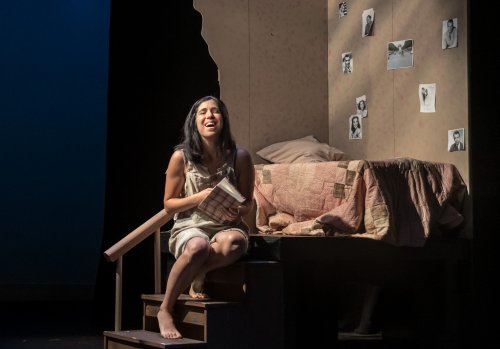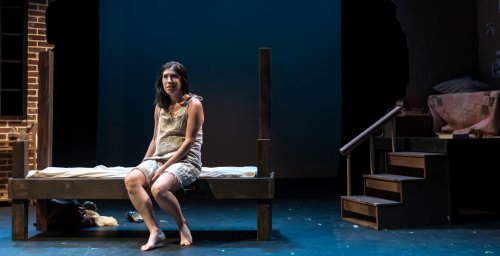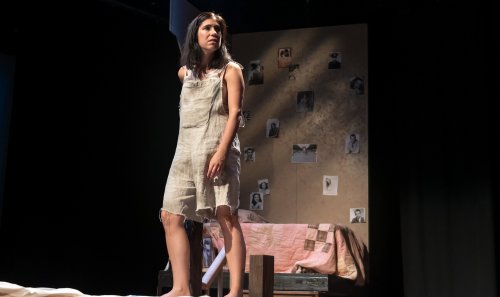Anne Being Frank
A novel, caustic examination of an iconic, beloved victim of the Holocaust.

Alexis Fishman as Anne Frank in a scene from Ron Elisha’s “Anne Being Frank” at the 28th Street Theatre (Photo credit: Richard Rivera)
[avatar user=”Joel Benjamin” size=”96″ align=”left”] Joel Benjamin, Critic[/avatar]
Anne Frank. What more is there to know about this iconic symbol of the horrors of the Holocaust? Do we need another dramatization of her life? Didn’t that old chestnut, The Diary of Anne Frank, on the New York stage (1955, 1997) and film (1959, 1967, 1980), tell the whole sordid story?
Far from it, at least according to playwright Ron Elisha.
Elisha has written a refreshing new take on Anne Frank’s life. Called Anne Being Frank (a title that should, perhaps, be reconsidered), the one-person, multi-character show posits a surreal possibility, that Frank managed to survive the War and decided to rewrite her oft-expurgated famous Diary.
Although Anne Being Frank is artfully situated in the heroine’s fertile, doomed mind, three temporal locations are represented in Colleen Shea’s set: the attic where Anne and her family hid until betrayed; a concentration camp bunk; and an office at a book publishing company represented by a desk with modern accoutrements. Shea also provides slides of photographs and dates.
Anne’s effort at revising and deepening her diary are being torn apart, censored and otherwise thwarted by Mr. Bow-Tie, her editor. As he goes through her manuscript, pretty much line-by-line, she relives all of her terrors. Her continual battles with Bow-Tie kick start her total immersion in her past, starting with her bare-bones bunk at Bergen-Belsen.

Alexis Fishman as Anne Frank in a scene from Ron Elisha’s “Anne Being Frank” at the 28th Street Theatre (Photo credit: Richard Rivera)
After stripping off her tailored business suit—costumes by Noah Berch—she becomes the fragile, teenage girl revealing a survivor’s spine of steel. She establishes a sexual relationship with a young SS guard, nicknamed Pimply Face, a relationship that “rewards” her with writing materials in exchange for the loss of what is left of her humanity. Anne’s descriptions of these events, via the pungent lines of Elisha’s script, are stomach-churning. That this “relationship” leads to a bloody finish makes even more dramatic.
These explicit bits are constantly criticized by Bow-Tie who is intent on not offending anyone, much to Frank’s consternation. She acts ever more agitated with his arbitrary editorial rulings.
She travels back to the famous hidden secret annex in the townhouse of Jan and Miep Gies, two of her father, Otto Frank’s employees. There she muses on her early life, moving from Germany to Holland as a young girl when Hitler’s rise threatened her Jewish family. Her father’s newfound success in Amsterdam, again, is thwarted by the Nazis.
Elisha shines a new light on the claustrophobic months hiding in the Gies attic, not fearing to offend audiences, a fear that the much neater earlier versions of this terrible, unjust whitewashed to make it palatable to 1950s audiences.
Australian actress Alexis Fishman artfully transitions from character to character and location to location. She speaks Anne’s lines with just a hint of a Dutch accent. This Anne is a smart, warm, angry and, yes, sensual woman, probably what she would have become.

Alexis Fishman as Anne Frank in a scene from Ron Elisha’s “Anne Being Frank” at the 28th Street Theatre (Photo credit: Richard Rivera)
She also captures the phoniness of Bow-Tie’s hypocritical utterances and the creepy German accent of Pimple Face.
What gives Elisha’s play its power—aside from Fishman’s commanding, nuanced performance and Amanda Brooke Lerner’s incisive direction—are the imaginative details that, in 90 minutes, paint a portrait that is difficult to forget.
Period music and G. Benjamin Swope’s stark lighting contribute a great deal.
Near the end of the play, a heartbreaking episode involving a bag of food makes a mockery of the most famous line from the actual Diary: “In spite of everything I still believe that people are really good at heart.”
Anne Being Frank is a production of the Emerging Artists Theatre which is also presenting, in repertory, two other plays at the 28th Street Theatre.
Anne Being Frank (through October 29, 2023)
Emerging Artists Theatre
28th Street Theatre, 15 West 28th Street, in Manhattan
For tickets, visit http://www.EmergingArtistsTheatre.org
Running time: 90 minute without an intermission




I saw the play opening night and was astounded by the brilliance of Amanda Brooke Lerner’s direction which took the wonderful Alexis Fishman between time frames, locations and characters seamlessly yet precisely and clearly. This play should be on Broadway!